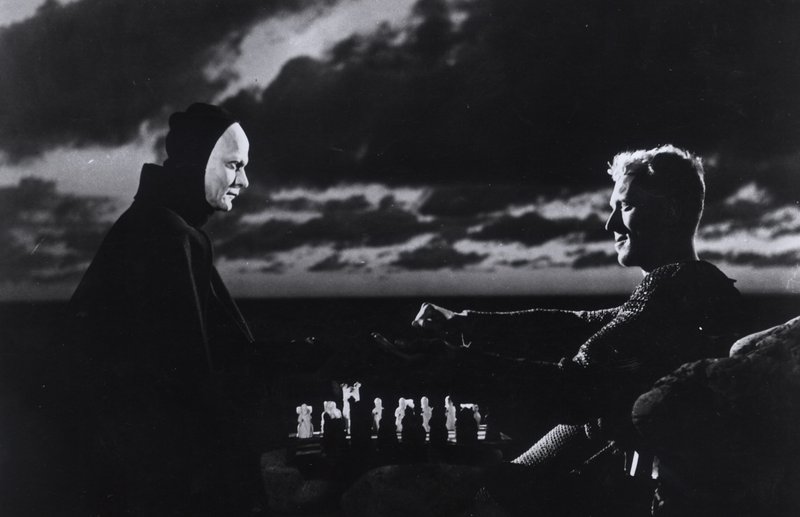The Danse Macabre: Existentialism and the Seventh Seal
Ingmar Bergman is regarded by many to be one of, if not the, greatest directors of all time. He was born in Sweden and is regarded for an immensely packed filmography with a multitude of masterfully written and directed films. His filmography ranges from the romantic drama of Wild Strawberries to the surrealist masterpiece of Persona. However, one film from Bergman has stood the test of time as one of the greatest achievements of world cinematic history, The Seventh Seal.
The film follows the disillusioned knight Antonius Block, played by Max Von Sydow, and his nihilistic squire Jöns, played by Gunnar Björnstrand, as they return home to Sweden after the crusades. In this film, Antonius encounters the personification of Death, played Bengt Ekerot, on a beach. To prevent Death from taking him to the afterlife, Antonius challenges Death to a game of chess, with the condition that he is allowed to live for as long as the game goes on. If Antonius wins, he is allowed to live, if Death wins, then his life is forfeit. This is important in understanding the inherent existential themes of The Seventh Seal.
To most existentialists, a choice is an omnipresent fact of life. The freedom of will to choose one’s own destiny. This, however, is contradicted by only one thing, death. The film, however, calls this fact of life into question. When Antonius engages with death in a game of chess it is to buy time. However, this time is not to simply extend his life due to a fear of death. He seeks to extend it to find an answer and to find meaning in what he describes as a “futile life”. Antonius seeks an answer to God’s silence.
The silence of God is a recurring element of The Seventh Seal’s story. Throughout, Antonius prays to god. He seeks god because, to him, God lies within a realm of obscurity between pure faith and pure knowledge. One part of this juxtaposition is represented by the flagellants. They subscribe to pure faith and are willing to act against their own wellbeing in an attempt to appease the god of which they truly know nothing. The other part of this juxtaposition, the representation of pure knowledge, is found in the cynicism of Jöns, his squire. It is in between these two extremes that Antonius seeks to understand God. This is why when he encounters a young girl accused of witchcraft about to be burned alive, he asks her to summon the devil. His reasoning is that if the devil exists then he must know of god. However, his hopes are dashed when she says that she has already summoned him and that he is all around, yet Antonius cannot perceive him. This encounter leaves him with the grim realization that even those supposedly in direct contact with the devil are no different than the flagellants of blind faith.
It is through these experiences that Antonius discovers that he will find no meaning searching for a silent god. The meaning that he seeks in his life is derived from his actions. The choices he makes to save his life or the life of others. This is the answer to his existential dread. At one point during the film, Antonius seems to be holding his own and even showing a possibility of escape. However, not one to be cheated, Death implies that if he cannot have Antonius’ life, then he shall have the life of another. The shot then pans to the young child, Mikael, of Antonius’ traveling companions, Jof and Mia. The realization that Antonius may be putting the life of a young child in danger to save his own gives him the chance to do the “one meaningful deed” of which he sought since he left for the Crusades. Antonius knocks the pieces off the chess board allowing Jof and Mia to escape with their son. Jof with his second sight sees the opportunity Antonius has given to escape from Death and seizes it. Once the pieces have been returned and Jof’s family has escaped, Antonius ends the game; and therefore, his life is forfeit. It is after this game that Death asks if he had done his “meaningful deed”. Antonius responds that he has. It was in this moment that Antonius succeeded in finding meaning because he realized that he would find none. At that moment he knew that simply extending his life would not beat the existential dread that had been weighing on him since his return. Except for this time, he would have the death of an innocent child on his conscience. Instead, he realized that only his actions could give meaning to his life. By saving the life of young Mikael, Antonius could die happy knowing that he had lived to choose to save another. This realization is summed up quite eloquently by Jean-Paul Sartre and is as follows:
Man is condemned to be free; because once thrown into the world, he is responsible for everything he does. It is up to you to give life a meaning.

Vince Orozco is THE Managing Editor for “The Tiger Print.” Vince’s skills include rapping and writing long essays that nobody reads. In school, he...




